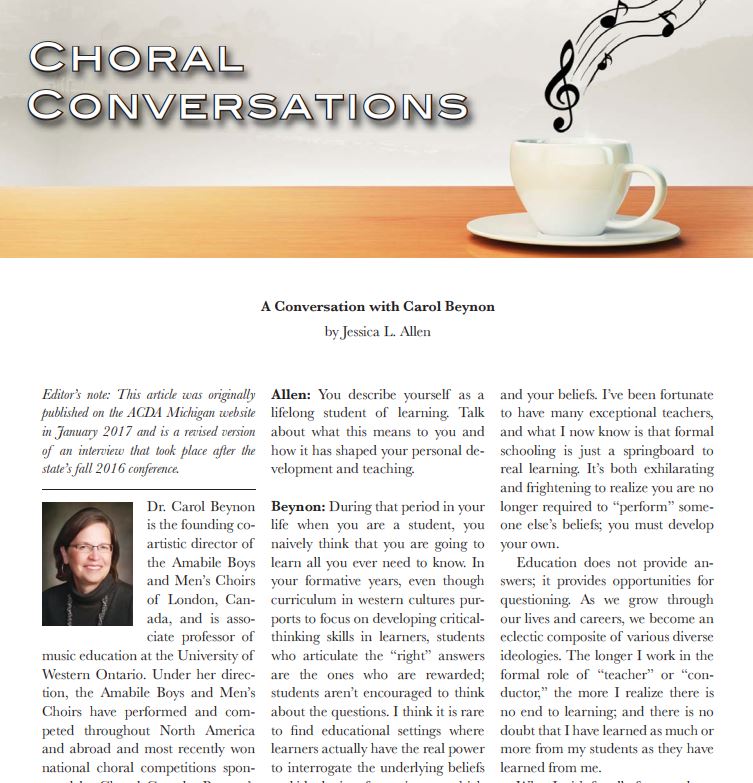
_____________________________
Choral Journal’s ongoing column called Choral Conversations” features interviews with noted choral conductors and composers. The fifth interview in this series took place with Carol Beynon in the October 2017 issue.
You can read the interview in its entirety online at acda.org/choraljournal. Click “Search Archives” and choose October 2017 from the dropdown menu.
_____________________________
You are the founding and co-artistic director of the Amabile Boys and Men’s Choirs of London, Canada, and work extensively with men’s choirs. Gender identity is one of your research subject areas. As a female conductor, do you address masculine identity in rehearsal settings with male singers?
It’s interesting that you ask about gender because I was challenged recently, yet again, about being a woman conductor of male choirs. It’s definitely not a question that would ever be asked of a man conducting any kind of choir, and it assumes a rigid binary of genders that we now know to be a societal, hierarchical construction.
With respect to masculinities, focusing on our singers’ individual and collective identities is multifaceted and complex terrain. Having a “male-only” choir has actually helped us recruit more boys and men to singing such that I believe we may have the largest community-based, male choral organization in Canada. There is a body of literature that expounds the advantages of single gender learning, which I won’t go into here except to say that in terms of increasing the number of males singing, this model has worked well for us.
While we work with boys and men from age eight and up, masculine identity is not something we talk overtly about; rather, we live it through our experiences and expectations of singing and travelling together. Character development, for example, is part of our mission, and we promote that in various ways—through repertoire that focuses on aspects like social justice, solidarity, acceptance, inclusion, peace, and cultural diversity, to name a few.
Within the choirs, we deconstruct and make explicit texts and musical motifs that help us see the world through different lenses. We talk about how music can be a powerful form of communication to deal with life’s complexities in a shared way. Singing can help us to understand and deal with sensitive topics. We also involve the boys and men in professional workshops on male singing with leading music teachers and conductors; in these sessions, they openly discuss the impact of singing on their sense of self and being; how it impacts not just their musicianship but forces them to question their own values, ideologies, and their ever-changing identity. It’s interesting to note that when they perform publicly, the boys and men present a different view of masculinity from the norm to their audiences, and they are often questioned about that.
What advice do you have for young conductors?
The greatest gift a conductor can give herself is to become a sponge. I recommend that all conductors—young and old—observe (or better yet, sing with) as many conductors as possible. Watch everyone, and rather than be critical of what they might be doing, ask yourself what you can learn. If you hear or see something that’s exceptional (or not), try to analyze why that is. Question, question, question! Talk to people; talk to yourself! Watch carefully, analyze, question, and open your mind to the informal learning opportunities that surround you each and every day.
_____________________________
Read the rest of this interview (and more!) in the October 2017 issue of Choral Journal.


Leave a Reply
You must be logged in to post a comment.